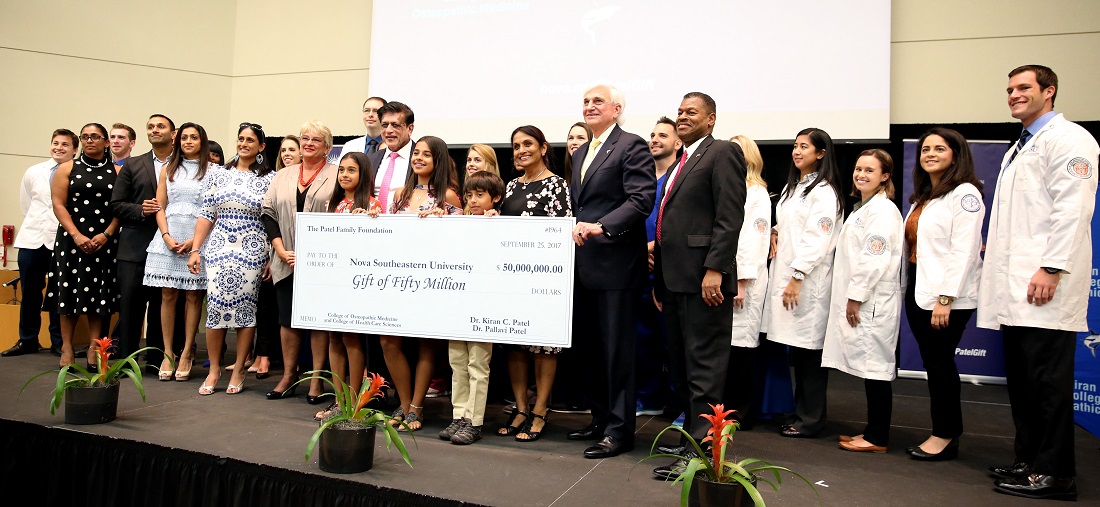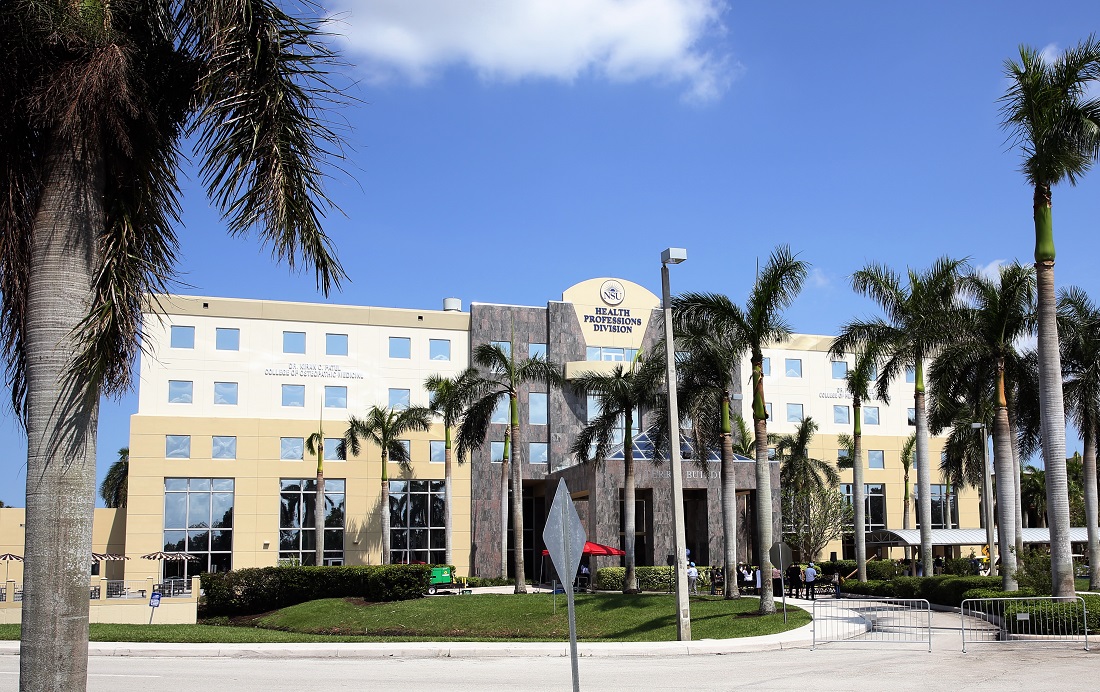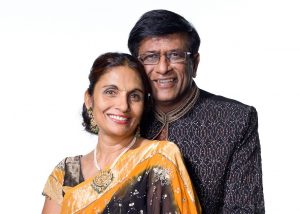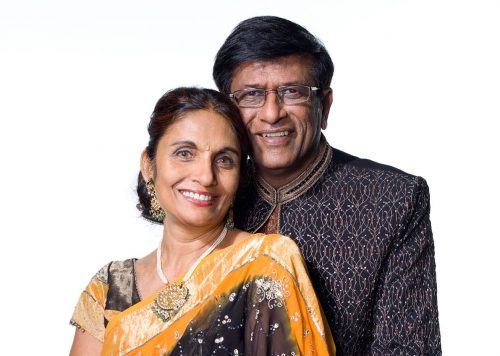Last September, Drs. Kiran and Pallavi Patel announced a partnership with Florida’s Nova Southeastern University to advance healthcare on three continents.

By Jayshal Sood
As his private Bombardier Global 5000 takes off from the Fort Lauderdale-Hollywood International airport into the bright mid-afternoon southern Florida sky and jets toward Clearwater on the Gulf coast, his hometown for the past several decades, Dr. Kiran Patel is a picture of tranquility.
Nothing in his face betrays the fact that he and his wife, Dr. Pallavi Patel, who’s sitting a few feet away talking to a reporter, had just written the largest philanthropic check cut by an Indian American for a US institution.
That’s because the mind of the 69-year-old cardiologist, entrepreneur and philanthropist, on that late September afternoon, was already transfixed on his next project, and the one after that.
“Once I climb a peak, I don’t sit there to enjoy,” he says. “I set my eyes on the next peak.”
And that next challenge is to create two universities: one each in India and Zambia, the country he was born in.
Through their foundation — Drs. Kiran & Pallavi Patel Family Foundation — the Patels pledged $200 million to the Nova Southeastern University, a private research university on Monday. Of the commitment, $50 million is in direct contribution and more than $150 million will be in investment toward building a medical education complex in Clearwater.
READ: Indian Americans Kiran and Pallavi Patel pledge $200 million to Florida’s NSU (September 25, 2017)
The $50 million direct contribution is the largest in the history of NSU and seventh-largest donation received by a Florida university.
“For this to become a reality, that kind of investment was necessary,” he points out.
At an event on the school’s Davie, FL, campus — 25 miles to the north of Miami — where the gift was announced on September 25, 2017, both university officials and the couple underlined the transformational nature of the donation, which will advance healthcare in the United States, India and Zambia, among other places.
For NSU, the donation will help increase the number of physicians produced by the newly named Dr. Kiran Patel College of Osteopathic Medicine from 230 to 380 per year. The university is already the largest provider of physicians and physician assistants in Florida. The gift will also help expand the school’s footprint in the Tampa area with the construction of a new 27-acre regional campus.
The Patels intend to make use of NSU’s infrastructure and expertise to improve healthcare in India and Zambia and engage the university to train healthcare professionals in these countries at an affordable cost.
The universities that they are setting up in India and Zambia will have access to NSU’s curriculum. Students will travel between these countries and spend a significant portion of their time in the United States as well.
READ: Philanthropist Kiran Patel to build osteopathic school in Florida to help poor students from India, Africa become doctors (December 26, 2016)
“We will be connecting classes everywhere,” says Patel. “The same curriculum that is taught in the United States will be taught to students in India and Africa.”
By taking the world-class American education to India and allowing students from Africa and the United States to enroll there, the philanthropist says he will be able to significantly reduce the cost of a medical degree, which now runs into hundreds of thousands of dollars.
“A Zambian student can stay in India for less than $2,000, including accommodation and food,” Patel says. “We are able to help thousands of people, and at the same time provide the quality education that is required.”

A consummate businessman — he built two billion-dollar businesses within a decade — for Patel, the donation was all about leveraging. “To stretch the same dollar to impact 10-fold, 20-fold, 100-fold, that’s what I enjoy,” he says.
It is by stretching dollars that Patel and his wife were able to create wealth that they are using for philanthropic causes.
The couple, who moved to the United States on Thanksgiving Day in 1976, started their first venture in 1982, a multi-specialty network of physicians’ practice. In 1992, they bought a small health maintenance organization and turned it into the largest HMO in Florida. By the time they sold the firm in 2002, it had more than 400,000 members and revenue in excess of $1 billion.
In 2007, they reentered the managed care business by buying a company that provide healthcare plans. Last October, the company — America’s 1st Choice — was sold to Anthem for an undisclosed amount. Local reports indicate that the transaction was worth roughly $1 billion. The couple still has hospitality and real estate businesses that are worth hundreds of millions of dollars.
READ: Florida’s Nova Southeastern University names its medical school after Dr. Kiran Patel (September 25, 2017)

Donating top-dollars is not a new experience for the Patels — even though everything they did before paled in comparison to their latest giving, or for that matter, any single gift by an Indian American. The largest donation prior to Monday was by the New York couple Chandrika and Ranjan Tandon, who pledged $100 million to the NYU School of Engineering in October 2015.
Since they exited from WellCare, the Patels have been contributing generously to causes and institutions in Florida and internationally. Among the biggest beneficiaries of their largesse is the University of Southern Florida, where they helped create two cutting-edge institutions: the Patel College of Global Sustainability, which is one of the only two schools of its kind that train engineers, entrepreneurs and environmental managers to lead sustainability projects worldwide; and the Dr. Kiran C. Patel Research Institute, which conducts clinical research.
In Tampa, they also helped establish the Dr. Pallavi Patel Performing Arts Conservatory, at the Straz Center for the Performing Arts, with a huge grant. The donation helped the Center jumpstart a project that had come to a halt. Today, the Patel Conservatory is the only accredited performing arts conservatory housed within a major performing arts center in the United States.
The couple also funds a number of initiatives in India, especially in Gujarat, where they have built several hospitals and a modern school, among other projects. Many of these initiatives were funded through a nonprofit founded by Kiran Patel’s father, Chhotubhai Patel, the philanthropic mentor and philosopher to the couple, in the early ’80s.
READ: Patel Family Foundation joins Florida school’s Puerto Rico campus relief efforts (October 6, 2017)
They also have supported philanthropic causes, mainly in the area of healthcare, in Zambia, Tanzania and Jamaica.
Despite their fabulous wealth, the Patels live frugally by the standards of someone of their net worth.
“The only things I spend money on are my home, my office and my car, where I spend 85 percent to 90 percent of my time,” he says.
One of the three exceptions to frugality is a complex of three palatial houses that he is building on a 17-acre lot overlooking a small lake in northwest Tampa. Three generations of the Patel family, which consists of three children and several grandchildren, will move into these houses in a little over a year. Patel would not discuss the cost of the house, but would only say that he has been employing more than a hundred people for the past five years.
But even the houses, which might appear to be lavish for many, are not necessarily extravagant for someone of his wealth. A perception of grandness apart, it costs only a fraction of the money that he’s spending on philanthropy. Just the interest on the money that he’s giving away alone can support an unimaginable lifestyle.
But that’s not who he is.
Frugality is in the DNA of Patel, who, as a teenager in Zambia, saved his pocket money to buy ship tickets to India for his whole family in the 1950s. Another quality he inherited is passion for philanthropy. His father started a trust in his Gujarati village after he moved back from Zambia, with practically no money. The son’s first major act of philanthropy was the construction of a modern hospital in his dad’s name in the same village.
READ: Patel College of Global Sustainability in Florida chosen by UNWTO as a tourism observatory (December 20, 2016)
His wife of 44-years, Pallavi, says it’s a no-brainer that he would want the land of his ancestors, the land where he was born and the land that made him who he is to benefit from his single biggest philanthropic act.
Now looking back — from the perspective a Bombardier flying at over 20,000 feet altitude provides — the philanthropist is happy with the way the rollout of the NSU gift went. “It took less than 100 days to iron out all the details,” he says.
However, he is also aware that he is likely to face hurdles in establishing the medical school in India.
Even though he lived in the country for barely six years — he went to Ahmedabad in 1967 as a teenager to enroll for an undergrad degree and returned to Zambia in 1973 with a medical degree and a wife — Patel knows India very well. He seems to be mentally prepared to navigate the bureaucratic maze.
Being a businessman, Patel has a Plan B: If he runs into trouble with Indian authorities, he has the option of NSU granting degrees.
With BD-700 about to start its descent, with the Gulf of Mexico visible in the distance, Patel moves back to his seat, next to his wife’s. After spending four hectic days in the Fort Lauderdale area, filled with dozens of media appearances, a keynote at a white coat ceremony, an event where two schools were named after him and his wife, and, of course, several lunches and dinners, there’s only one thing he is preoccupied with at the moment. He says, “I am focusing on the implementation and execution of how the money will be spent.”
RELATED STORIES:
Dr. Kiran Patel of Florida building the largest single-family estate in the US (April 20, 2015)
7 Indian American recipients of ‘Outstanding Americans by Choice’ (February 11, 2017)



